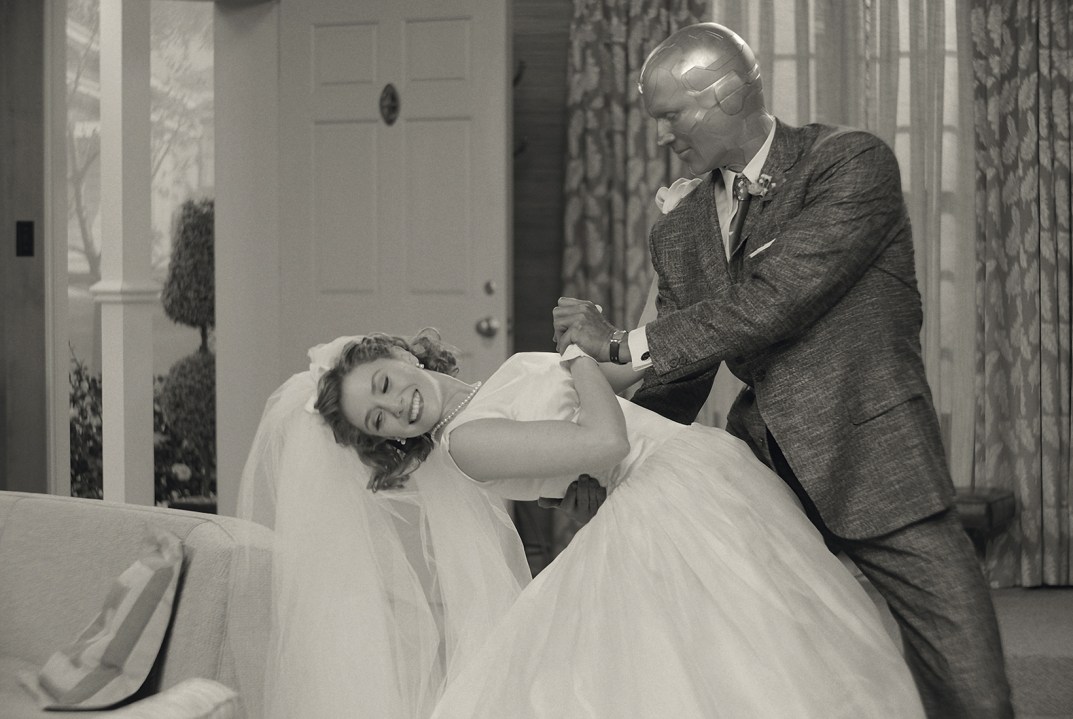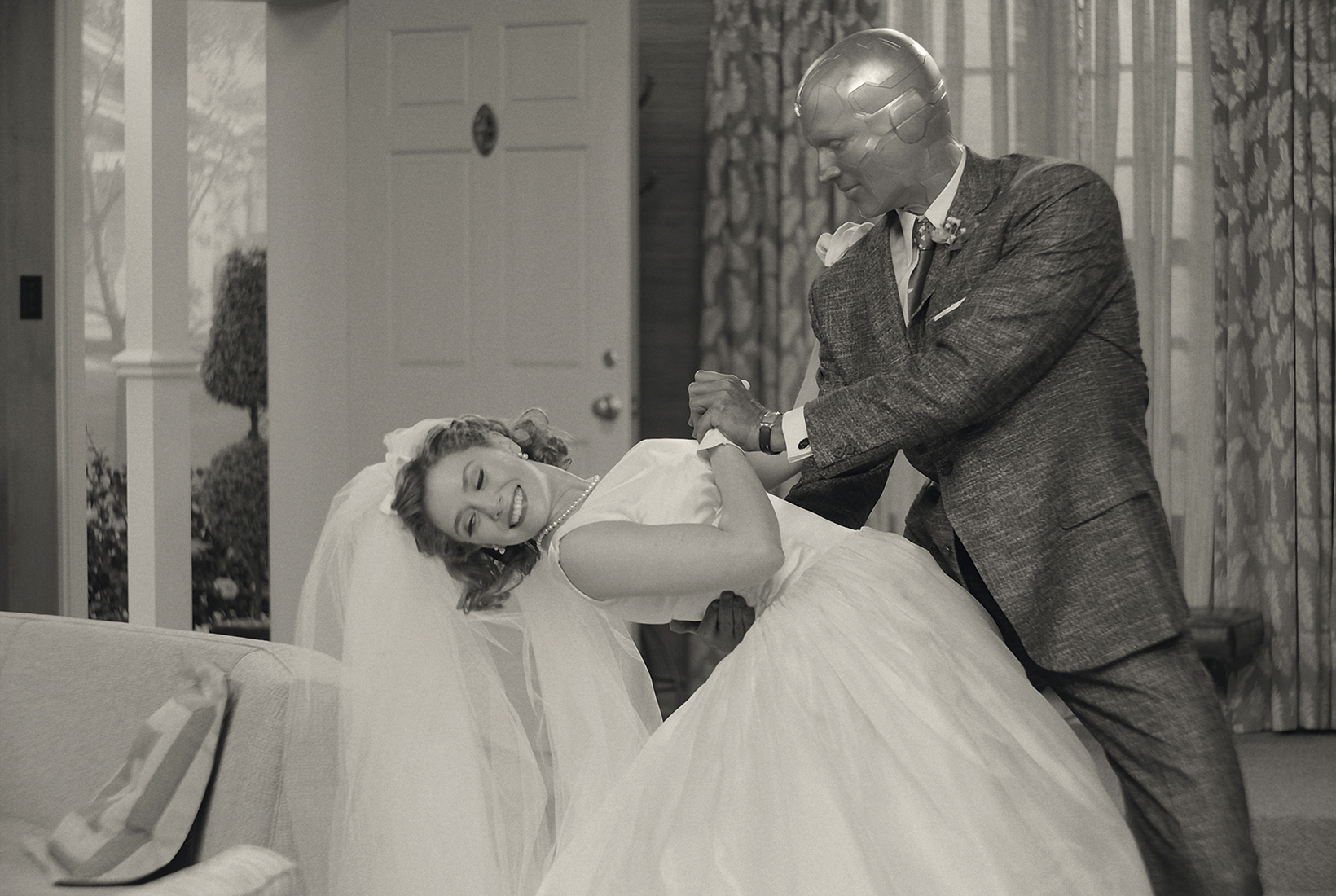‘What the world needs now is a black and white pastiche of classic 1950s and 1960s sitcoms reviving two Marvel superhero characters who were last seen getting killed in Avengers: Infinity War and Avengers: Endgame,’ said… well, I was about to say: ‘said no one ever’. But clearly someone did, because this is what we’ve now got on Disney+: a bizarro series called WandaVision.
I feel terribly out of the loop for not quite getting it. But possibly I’m not the target audience. For a start, I haven’t seen either of those Avengers movies; nor am I sufficiently familiar with the nuances of the Marvel comics universe to get all the frequent knowing references, such as the pastiche adverts for toasters produced by Stark Industries. Watching it is a bit like trying to understand some typically obscure but fashionable meme. You would ask a teenager to explain — but you know you’d only get a contemptuous sigh and an eye-roll.
Anyway, it stars Paul Bettany as the android Vision and Elizabeth Olsen as his telekinetic wife Wanda Maximoff (aka Scarlet Witch). For reasons we have yet to learn — an air of mystery and foreboding looms over the early episodes; clearly there is going to be a Big Reveal — they have come back to life after their big-screen deaths and been transported to a cosy idyll called Westview in 1950s suburban America, where all may be not as it seems.
Watching it is a bit like trying to understand some typically obscure but fashionable meme
My immediate reaction was that it’s a charming, exquisitely done, pointless confection. Huge efforts have gone into recreating, with near-perfection, the mood, tone, decor, the social mores and arch, homely, dated humour of series such as The Dick Van Dyke Show and I Love Lucy.
So, in the first episode, we have Vision and Wanda playing out a farce in which the difficult boss and his wife are coming to dinner and they have to impress or Vision will be denied promotion at the computer company where handily (because he’s very good at it) he has found a job. The wrinkle is that they’ve forgotten — until it’s too late — what the significance of the heart they’ve marked on the calendar is. It actually refers to the boss’s surname but Wanda, misdirected by her nosy neighbour Agnes (Kathryn Hahn), thinks it might be her anniversary and so dresses for the evening in a sexy negligee, leading to all manner of japesome and clunkily implausible confusion.
It’s perfectly pleasant to watch, not least because of the chemistry between Bettany and Olsen, and their deadpan skills at parody. But you do find yourself yearning for a bit more of an incentive than merely being reminded that the 1950s was a more innocent, patriarchal and hierarchical era and that in sitcoms actors spoke as if addressing a hard-of-hearing audience at a village pantomime. This will come, I’m sure, as the series develops. The retro TV references — episode two moves to the 1960s (Bewitched, etc.), episode three to the 1970s (Brady Bunch, etc.) and so on — are just a bonus and an excuse to show off its ritzy production values and sophisticated irony. I expect — and hope — it will get a lot richer and darker.
A Discovery of Witches is back on Sky Atlantic. Even though I only started watching it in order to sit companionably with my womenfolk — it’s about smouldering vampires, empowered witches and dangerous demons, which I think steers it dangerously into the girls-only territory of stuff like Twilight — I became so hooked by the first series that I was really looking forward to the second.
But it’s proving a disappointment. In this one the main characters — vampire Matthew Clairmont (Matthew Goode) and witch Dr Diana Bishop (Teresa Palmer) — have quit 21st-century Oxford and gone back in time to late 16th-century London where it turns out, inter alia, that Kit Marlowe is a demon.
I’ve no problem with that last detail. What I find inexcusable, though, is that one of Shakespearean England’s greatest gay roisterers (‘All they that love not tobacco and boies were fools,’ he once vouchsafed before later getting himself stabbed to death in a pub, possibly because he was a secret agent) should be reduced in this adaptation to a whiny, sulky milksop.
Lots of money has been well spent recreating Elizabethan London only to be squandered on workaday, listless dialogue and plots that threaten to teeter on the brink of excitement but rarely go all the way. Watching the hero brood and the heroine pout just isn’t going to be enough for me. The girls can have this one to themselves.








Comments